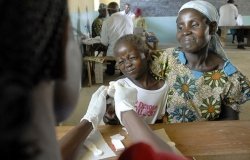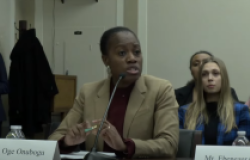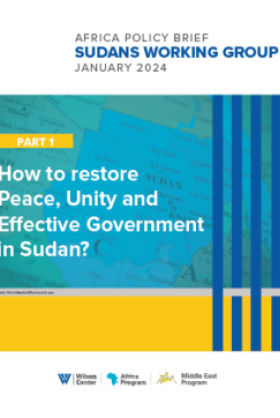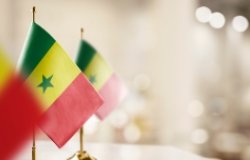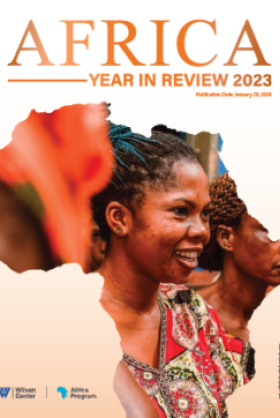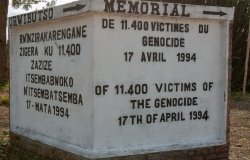Revitalizing the Peace Process in Darfur
The Africa Program joined The Initiative for Inclusive Security and International Crisis Group in hosting a discussion with Carla Koppell, Director of The Initiative for Inclusive Security, Dave Mozersky, Director of the Horn of Africa Project, International Crisis Group and Ken Bacon, President of Refugees International.
Overview
"Revitalizing the Peace Process in Darfur"
A discussion with:
Ken Bacon, President, Refugees International - moderator
David Mozersky, Director of the Horn of Africa Project, International Crisis Group
Carla Koppell, Director, Initiative for Inclusive Security
On May 1, 2007, the Africa Program at the Woodrow Wilson International Center for Scholars, the Initiative for Inclusive Security and International Crisis Group hosted an event entitled "Revitalizing the Peace Process in Darfur" to launch a brand new report by the International Crisis Group entitled the same as the conference.
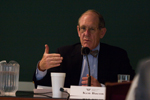 Ken Bacon moderated a dense and informative discussion in which the two panelists presented very recent information about the situation in Darfur and their views on what must be done to revitalize the peace process. To begin the discussion, Bacon commented that current efforts by civil society in Europe and North America are focused on getting a new United States Special Envoy to the region, the possibility of sanctions, and the issue of a UN peacekeeping force into Darfur. One year after the signing of the Darfur Peace Agreement (May 5, 2006), signatory parties have for the most part rejected it. In fact, there is now even more violence and it has become even more difficult for humanitarian aid groups in the region, Bacon said.
Ken Bacon moderated a dense and informative discussion in which the two panelists presented very recent information about the situation in Darfur and their views on what must be done to revitalize the peace process. To begin the discussion, Bacon commented that current efforts by civil society in Europe and North America are focused on getting a new United States Special Envoy to the region, the possibility of sanctions, and the issue of a UN peacekeeping force into Darfur. One year after the signing of the Darfur Peace Agreement (May 5, 2006), signatory parties have for the most part rejected it. In fact, there is now even more violence and it has become even more difficult for humanitarian aid groups in the region, Bacon said.
 Reiterating Bacon's points about the situation of violence on the ground, David Mozersky also noted the near total vacuum on the political side shown by both signatory and non-signatory parties in Sudan. The aim of a brand new paper by the International Crisis Group, entitled the same as this conference and released the same day, is to refocus attention on a political solution to the conflict, which is the only really sustainable choice. He advocated for a comprehensive strategy to bring about peace, including the revitalization of the Darfur Peace Agreement in a much more substantive and inclusive manner; the consolidation of rebel groups and excluded constituencies to share a platform for negotiation with the government; and new, stronger, and more unified international pressure to reopen negotiations.
Reiterating Bacon's points about the situation of violence on the ground, David Mozersky also noted the near total vacuum on the political side shown by both signatory and non-signatory parties in Sudan. The aim of a brand new paper by the International Crisis Group, entitled the same as this conference and released the same day, is to refocus attention on a political solution to the conflict, which is the only really sustainable choice. He advocated for a comprehensive strategy to bring about peace, including the revitalization of the Darfur Peace Agreement in a much more substantive and inclusive manner; the consolidation of rebel groups and excluded constituencies to share a platform for negotiation with the government; and new, stronger, and more unified international pressure to reopen negotiations.
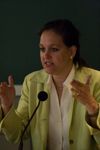 Carla Koppell telescoped down on the issue of inclusiveness in the negotiation process and how to do it in Darfur. Importantly, past negotiation efforts have largely failed due to a lack of buy-in by the parties involved. A process developed by the Initiative for Inclusive Security seeks to include all groups, such as Arab tribes, internationally displaced persons, but especially, women. Women are 85% of the displaced population in Darfur, which is reason enough to include them in the discussion. And yet, what may be more pressing and constructive reasons for their inclusion are: they have a different role in society and they tend to have different negotiation styles which bring to the fore some different core issues. Koppell pressed for rounds of meetings to begin immediately at the local, grassroots level that would encourage women to come forward as stakeholders. From there, regional and eventually national meetings, with the inclusion of women, would filter up the important issues from the ground, create momentum and integrity, and move forward the broader political process whenever it is ready to receive input from such a faction of prepared civil society. This women-centered approach was successful in other processes, like those in Guatemala and Northern Ireland, Koppell noted.
Carla Koppell telescoped down on the issue of inclusiveness in the negotiation process and how to do it in Darfur. Importantly, past negotiation efforts have largely failed due to a lack of buy-in by the parties involved. A process developed by the Initiative for Inclusive Security seeks to include all groups, such as Arab tribes, internationally displaced persons, but especially, women. Women are 85% of the displaced population in Darfur, which is reason enough to include them in the discussion. And yet, what may be more pressing and constructive reasons for their inclusion are: they have a different role in society and they tend to have different negotiation styles which bring to the fore some different core issues. Koppell pressed for rounds of meetings to begin immediately at the local, grassroots level that would encourage women to come forward as stakeholders. From there, regional and eventually national meetings, with the inclusion of women, would filter up the important issues from the ground, create momentum and integrity, and move forward the broader political process whenever it is ready to receive input from such a faction of prepared civil society. This women-centered approach was successful in other processes, like those in Guatemala and Northern Ireland, Koppell noted.
Drafted by Thomas Gilchrist, Intern and Roseline Fodouop Tekeu, Program Assistant, Africa Program
Hosted By

Africa Program
The Africa Program works to address the most critical issues facing Africa and US-Africa relations, build mutually beneficial US-Africa relations, and enhance knowledge and understanding about Africa in the United States. The Program achieves its mission through in-depth research and analyses, public discussion, working groups, and briefings that bring together policymakers, practitioners, and subject matter experts to analyze and offer practical options for tackling key challenges in Africa and in US-Africa relations. Read more
Thank you for your interest in this event. Please send any feedback or questions to our Events staff.




